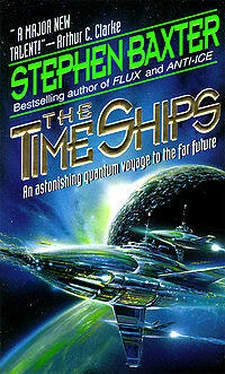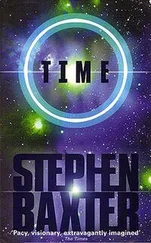“All of it.” His eyes were black. “You do not?”
“I’m not sure,” I said. “It all seems a sort of a dream, now — especially here, in this cold English rain.”
“But the Optimal History is the reality,” he whispered. “All of this” — he waved his hands about at innocent Richmond — “these partial, sub-Optimal Histories — this is the dream.”
I hoisted the jar of Plattnerite in my hand. It was a commonplace medicine bottle, plugged with rubber; needless to say, I had no idea of where it had come from, nor how it had got in amongst the struts of my machine. “Well, this is real enough,” I said. “It’s really quite a pretty solution, isn’t it? Like the closing of a circle.” I stepped towards the door. “I think you’d better get back — out of sight — before I ring.”
He stepped backwards, into the shadow of the porch, and soon he was quite invisible.
I tugged at the bell-pull.
From within the house, I heard the opening of a door, a soft shout — “I’ll go!” — and then a heavy, impatient tread on the stair.
A key rattled in the lock, and the door creaked open.
A candle, sputtering in a brass holder, was thrust through the doorway at me; the face of a young man, broad and round, peered out, his eyes puffed up with sleep. He was twenty-three or twenty-four, and he wore a battered, thread-bare gown, thrown over a crumpled night-shirt; his hair, a mousy brown, stuck out from the sides of his odd, broad head. “Yes?” he snapped. “It’s after three in the morning, you know…”
I’d not been sure what I had intended to say, but now that the moment was here, words fled from me altogether. Once again I suffered that queer, uncomfortable shock of recognition. I don’t think a man of my century could ever have grown accustomed to meeting himself, no matter how many times he’d practiced it and now that whole raft of feeling was overlaid with an extra sort of poignancy. For this was no longer just a younger version of me: it was also a direct ancestor of Moses. It was like coming face to face with a younger brother I had thought lost.
He studied my face again, suspicious now. “What the devil do you want? I make a point of having no truck with hawkers, you know — even if this was the appropriate time of day.”
“No,” I said gently. “No, I know you don’t.”
“Oh, you do, do you?” He began to push closed the door, but he had seen something in my face — I could see the look some ghost of recognition. “I think you’d better tell me what you want.”
Clumsily, I produced the medicine jar of Plattnerite from behind my back. “I have this for you.”
His eyebrows went up at the bottle’s odd green glow. “What is it?”
“It’s—” How could I explain? “It’s a sort of sample. For you.”
“A sample of what?”
“I don’t know,” I lied. “I’d like you to find out.”
He looked curious, but still hesitant; and now a certain stubbornness was settling over his features. “Find out what?”
I started to become irritated at these dull questions. “Confound it, man — do you not have any initiative? Run some tests…”
“I’m not sure I like your tone,” he said stuffily. “What sort of tests?”
“Oh!” I ran a hand through my soaked hair; such pomposity did not sit well on such a young man, I thought. “It’s a new mineral — you can see that much!”
He frowned, his suspicion redoubled.
I bent and set the jar down on the step. “I’ll leave it here. You can look at it when you’re ready — and I know you’ll be ready — I don’t want to waste your time.” I turned and began to make my way down the path, my footsteps on the gravel loud through the rainfall.
When I looked back I saw that he had picked up the jar, and its green glow softened the shadows of the candle on his face. He called: “But your name—”
I had an impulse. “It is Plattner,” I said.
“Plattner? Do I know you?”
“Plattner,” I repeated in some desperation, and I sought a more detailed lie in the dim recesses of my brain. “ Gottfried Plattner…”
It was as if I had heard someone else say it — but as soon as the words were out of my mouth, I knew they had had a sort of inevitability.
It was done; the circle was closed!
He continued to call, but I walked resolutely, away from the gate and down the Hill.
Nebogipfel was waiting for me at the rear of the house, close to the Time Machine. “It’s done,” I told him. A first touch of dawn had filtered into the overcast sky, and I could see the Morlock as a grainy sort of silhouette: he had his hands clasped behind him, and his hair was plastered flat against his back. His eyes were huge, blood-red pools.
“You’re a little the worse for wear,” I said kindly. “This rain—”
“It hardly matters.”
“What will you do now?”
“What will you do?”
For answer, I bent over and hauled at the Time Machine. It twisted up, clattering like an old bed, and settled to the lawn with a heavy thump. I ran a hand along the battered frame of the machine; moss and bits of grass clung to the quartz rods and the saddle, and one rail was bent, quite out of shape.
“You can go home, you know,” he said. “To 1891. We have clearly been brought back, by the Watchers, to your original History — to the Primal version of things. You need only travel forward through a few years.”
I considered that prospect. In some ways it would have been comfortable to return to that cozy Age, and to my shell of belongings, companions and achievements. And I should have enjoyed the company of some of those old chums of mine again — Filby and the rest. But…
“I had a friend, in 1891,” I said to Nebogipfel. (I was thinking of the Writer.) “Only a young fellow. An odd chap in some ways — very intense — and yet with a way of looking at things…
“He seemed to see beyond the surface of it all — beyond the Here and Now which so obsesses us all — and to the quick of it: to the trends, the deeper currents which connect us to both past and future. He had a view of the littleness of Humanity, I think, against the great sweep of evolutionary time; and I think it made him impatient with the world he found himself stuck in, with the endless, slow processes of society — even with his own, sickly human nature.
“It was as if he was a stranger in his own time, you see,” I concluded. “And, if I went back, that’s how I should feel. Out of time. For, no matter how solid this world seems, I should always know that a thousand universes, different to a small or a great degree, lie all around it just out of reach.
“I am become a monster, I suppose… My friends will have to think me lost in time, and mourn me as they will.”
Even as we had been speaking my resolution had formed. “I still have a vocation. I have not yet completed the task I set myself, when I returned into time after that first visit. A circle has been closed here — but another remains open, dangling like a fractured bone, far into futurity…”
“I understand,” the Morlock said.
I climbed into the saddle of the machine.
“But what of you, Nebogipfel? Will you come with me? I can imagine a role for you there — and I don’t want to leave you stranded here.”
“Thank you — but no. I will not remain here for long.”
“Where will you go?”
He raised his face. The rain was slowing now, but a thin mist of drops still seeped out of the lightening sky and fell against the great corneas of his eyes. “I, too, am aware of the closure of circles,” he said. “But I remain curious as to what lies beyond the circles…”
Читать дальше
Конец ознакомительного отрывка
Купить книгу









